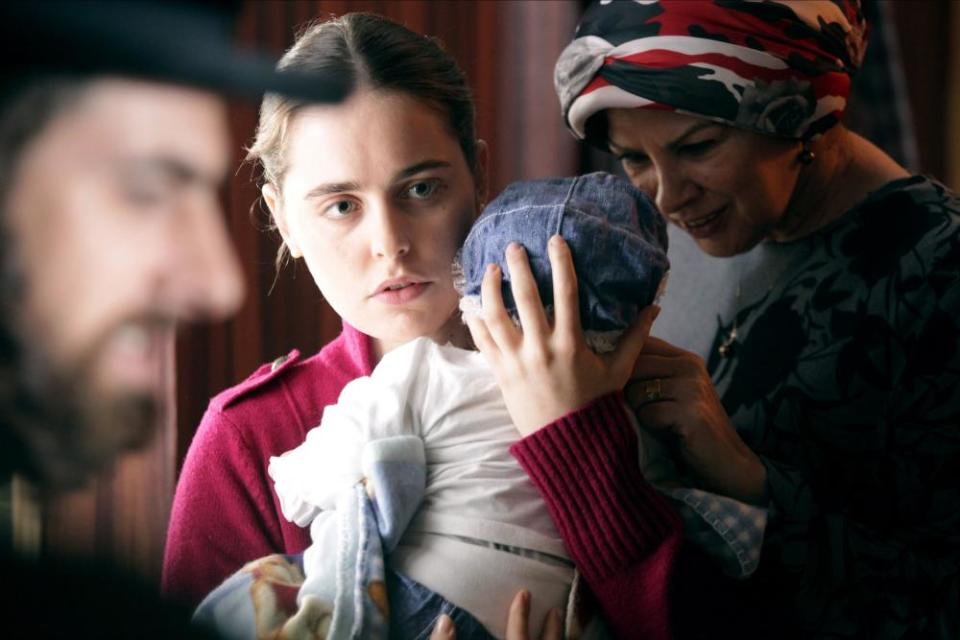Streaming: Shiva Baby and the best boundary-pushing Jewish films
Earlier this week, the best comedy of the year played in cinemas for a one-night-only engagement. Missed it? Don’t worry: it’s gone straight to streaming on Mubi instead. Emma Seligman’s Shiva Baby is a blunt, salty-sharp blast of inspired farce, arriving in the UK on a tide of cultish enthusiasm from across the Atlantic. There, it’s been hailed as an immediate classic of Jewish cinema, a subgenre as rich and flavourful in its sensibility as Christian faith-based films are, well, not.
A shiva is a Jewish wake, and sure enough, Seligman’s film seeks out any number of inappropriate comic avenues to pursue at a single funereal gathering, over the course of just 77 wince-filled minutes. University student Danielle (comedian Rachel Sennott, in a wicked breakthrough) is the only child of a middle-class New York Jewish couple, reluctantly dragged to the shiva for a family friend she barely remembers. Between bagels and murmured condolences, she gets her elders’ thoughts on everything from her weight (too thin) to her college major (too trivial) to her bisexuality (verboten, particularly with her sometime girlfriend also at the event).
What none of them know is that she’s making money on the side by offering sexual services to older men; when one of them shows up at the shiva too, with his wife and baby in tow, a classic bedroom-farce setup bumps up against more modern, abrasive inquiries into gender roles, sexual autonomy and queer identity.
Tensely structured but with a loose, reckless tongue, Seligman’s debut is clearly working on intimately familiar turf: her characters feel drawn from life, not other fictions. These anxious wallflowers and neurotic matriarchs (spitting out such one-liners as “She looks like Gwyneth Paltrow on food stamps, and not in a good way”) have the ring of truth that leads to stereotype, not the other way round.

I felt immediately compelled to revisit some of its genre forebears – beginning with American-Israeli filmmaker Rama Burshtein’s superb 2012 film Fill the Void (Curzon Home Cinema), which shares with Seligman’s film a youthful female point of view and an artfully visualised sense of claustrophobia within a community, albeit to more solemn effect. Depicting the psychological turmoil of an 18-year-old girl being pressured into marrying her late sister’s husband, its non-critical view of arranged marriage prompted much debate upon its release, but it’s a rare inside view of Orthodox Jewish womanhood.
Last December saw the passing of the great Joan Micklin Silver, the American filmmaker who blazed a trail for an expressly Jewish female perspective in the industry. While her landmark 1975 debut Hester Street sadly can’t be legally streamed in the UK — it’s not even easy to find on DVD — her lighter, brighter 1988 film Crossing Delancey (Amazon) is more readily available. And it’s irresistible, probably the quintessential Jewish romcom, starring a never-better Amy Irving as a sheltered bookworm who finds her love life split between her intellectual aspirations and her grandmother’s old-fashioned attempts at marriage-broking.

Rarer are films that present a masculine view of such meddling: one is the bouncy, sitcom-style Netflix film The Awakening of Motti Wolkenbruch, in which a Swiss-Jewish man’s crush on a shiksa falls foul of his mother’s plans for him. It’s an agreeable bit of schmaltz that nonetheless can’t hold a candle to the Coen brothers’ definitive comedy of Jewish masculinity in crisis: their indelible, nightmarish A Serious Man (Amazon), about a Minnesota nebbish in personal and professional freefall, resembles some kind of mad-libs collaboration between Philip Roth and Franz Kafka.
A wider spectrum of Jewish cinema, meanwhile, can be sampled at the ever-interesting on-demand platform service of the UK Jewish Film site, where selections range from lump-in-the-throat culture-clash romance The Cakemaker to the title-says-it-all comedy Oy Vey! My Son is Gay. For a more local perspective, the BFI Player’s Jewish Britain on Film section has a range of free-to-watch archival shorts and documentaries, offering an expansive view of a community still under-represented in UK cinema. Notwithstanding such worthy exceptions as Disobedience (BritBox) and Suzie Gold (BFI Player), north London’s own Shiva Baby awaits.
Also new on streaming & DVD
Ammonite
(Lionsgate)
Given a quiet digital release in March and now out on DVD and Blu-ray, this exquisitely mounted second feature from God’s Own Country director Francis Lee didn’t get the plaudits it deserved – particularly for Kate Winslet’s peak-form performance as 19th-century palaeontologist Mary Anning, whose speculatively queer romantic life Lee probes with care and grace. With everyone high on Winslet again after Mare of Easttown, it deserves a second look.
Godzilla vs. Kong
(Warner Bros)
Adam Wingard’s big, cheerfully dumb does-what-it-says-on-the-tin showdown is getting a belated cinema release after also going the digital route in spring – and yes, its lurid, single-minded theatre of destruction does merit blown-up screen treatment. But with it coming out on DVD and non-premium VOD, it’s equally suited to scream-along-at-the-screen sofa viewing with a favourite takeaway.

Made in Italy
(Lionsgate)
If you really are yearning for the continental holiday that is out of bounds to most of us this year, I suppose James D’Arcy’s Tuscan-set, cannoli-weight diversion might provide some faint balm. Still, its utterly inconsequential tale of a father and son (Liam Neeson and real-life junior Micheal Richardson) bonding and each finding romantic renewal abroad is an awfully anaemic pretext for landscape porn.
Merrily We Go to Hell
(Criterion Collection)
Back in 1932, the very title of this champagne-fuelled marital comedy from trailblazing director Dorothy Arzner was a point of scandal. That might not raise eyebrows today, but its study of a chic, hard-drinking party couple who experiment with an open marriage is still striking for its forward-thinking sexual politics and class critique – a quintessential example of Hollywood’s pre-Code progressiveness.

 Yahoo Movies
Yahoo Movies 
